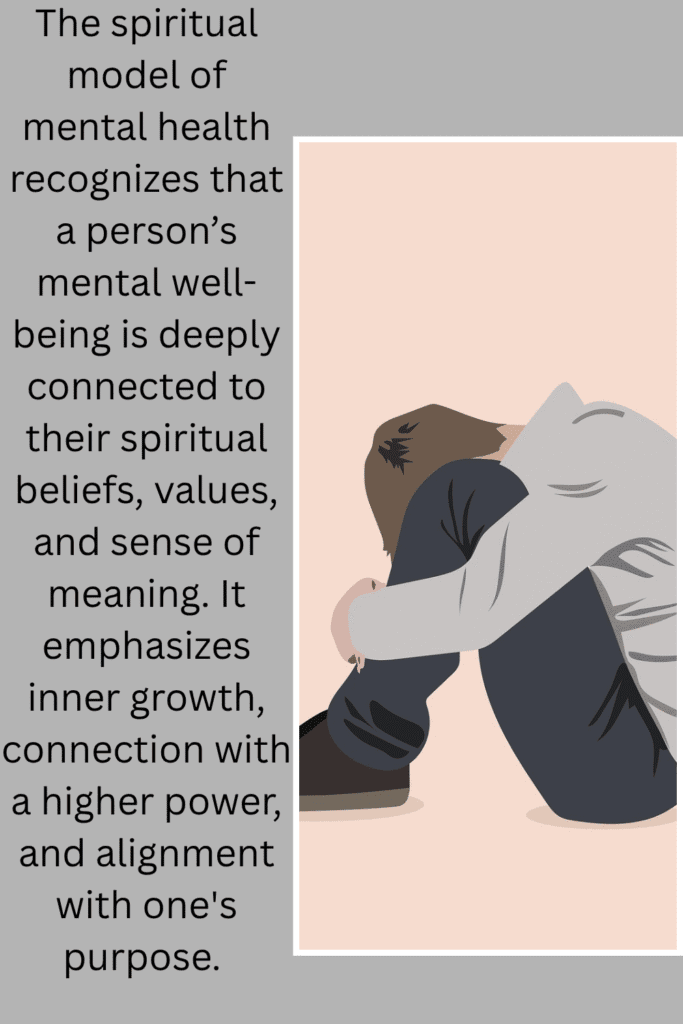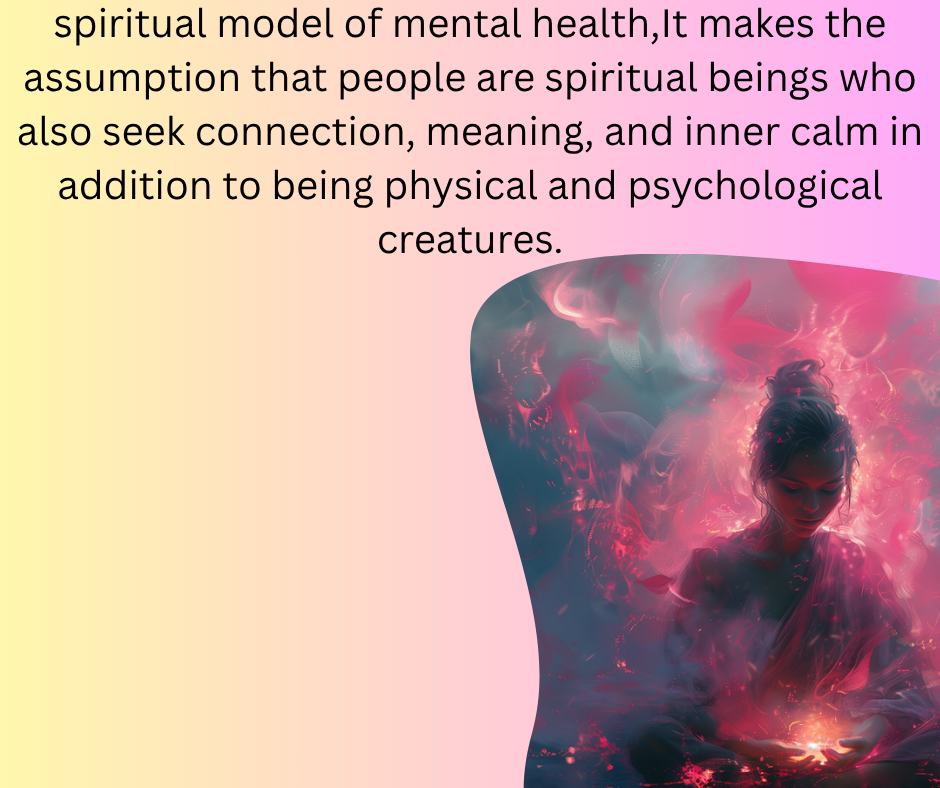spiritual model of mental health, awareness has grown significantly in recent years, especially across the United States. While traditional psychology and psychiatry focus on the brain, behavior, and environment, there’s an increasing interest in approaches that also acknowledge the soul, spirit, and inner life. This is where the spiritual model of mental health enters the conversation.

The spiritual model of mental health recognizes that a person’s mental well-being is deeply connected to their spiritual beliefs, values, and sense of meaning. It emphasizes inner growth, connection with a higher power, and alignment with one’s purpose. we will explore what the spiritual model of mental health is, how it differs from other models, its benefits, and practical applications in everyday American life.
Table of Contents
What Is the Spiritual Model of Mental Health?
A framework known as the spiritual model of mental health examines mental and emotional health from the perspective of spiritual well-being. spiritual model of mental health,It makes the assumption that people are spiritual beings who also seek connection, meaning, and inner calm in addition to being physical and psychological creatures.
Unlike traditional medical or psychological models that emphasize symptoms, diagnoses, and treatments, the spiritual model looks at the whole person—mind, body, and spirit. It invites folks to investigate life’s deeper questions:
What is my purpose?
- Why am I here?
- What happens after death?
- How can I grow and heal internally?
This model doesn’t replace medical or psychological treatment but complements it by integrating spiritual practices and beliefs into mental health care.
Core Principles of the Spiritual Model
Here are the foundational principles of the spiritual model of mental health:

- Holistic View of the Self
The self is not just a brain or a body, but a soul. Healing involves addressing emotional wounds, spiritual blockages, and personal growth. - Importance of Meaning and Purpose
People experience better mental health when they feel their life has meaning. Spiritual practices help uncover that purpose. - Faith, Hope, and Inner Strength
Belief in something greater—God, the Universe, or Higher Consciousness—provides strength during crises and emotional distress. - Interconnections
Spirituality emphasizes our connection with others, nature, and the divine, which reduces feelings of isolation and depression. - Healing Through Forgiveness and Compassion
spiritual model of mental health,Spiritual healing involves letting go of resentment, guilt, and fear, replacing them with love, forgiveness, and peace.
How the Spiritual Model Differs from Other Mental Health Models
| Model | Focus Area | Methods |
| Biomedical Model | Brain chemistry, medication | Psychotropic drugs, clinical diagnosis |
| Psychological Model | Thoughts, emotions, behavior | Cognitive Behavioral Therapy (CBT), counseling |
| Social Model | Environment, relationships, society | Support groups, community work |
| Spiritual Model | Inner soul, purpose, higher power | Prayer, meditation, mindfulness, faith-based healing |
While all models can be effective, the spiritual model offers a deep, inner transformation that many people find especially meaningful. It’s particularly popular in faith-based communities and among individuals exploring holistic wellness in America.
Why Is the Spiritual Model Gaining Popularity in America?
spiritual model of mental health,Many Americans are turning to spirituality not just as a religious practice, but as a tool for personal healing. The rise of yoga studios, mindfulness apps, spiritual retreats, and alternative healing centers reflects a growing interest in this approach.
Here are a few reasons why:
- Disillusionment with conventional treatments: Some individuals feel medication or talk therapy alone doesn’t address their deeper needs.
- Cultural shift toward holistic wellness: Wellness culture now includes spiritual care, self-reflection, and energy healing.
Increased anxiety and existential crises: People seek emotional stability and spiritual answers during uncertain times.
How Spirituality Supports Mental Health
Scientific studies have shown that spirituality and faith can offer numerous mental health benefits. These include:
1. Reduced Anxiety and Stress
Stress hormones like cortisol are decreased when the nervous system is calmed by prayer, meditation, and spiritual breathing exercises.
2. Increased Resilience
Believing in a higher power or divine purpose helps people handle life’s challenges with strength and hope.
3. Lower Risk of Depression
Lower rates of depression are associated with regular participation in religious or spiritual activities and a sense of belonging to a spiritual community.
4. Improved Self-Esteem and Identity
Spirituality helps people see themselves as more than their flaws, mistakes, or struggles. It offers a loving view of the self.
5. Greater Forgiveness and Healing
Many spiritual teachings encourage forgiveness, which helps people let go of resentment and mental burden.
Practical Spiritual Tools for Mental Health
The spiritual model is beneficial even if you don’t practice a particular faith. You can improve your mental health by engaging in the following spiritual practices:
1. Daily Prayer or Affirmation
Speaking or writing to a higher power (or your higher self) offers clarity, release, and hope.
2. Mindfulness Meditation
Practicing presence and observing your thoughts without judgment builds inner calm and mental clarity.
3. Journalism for Self-Reflection
Write about your spiritual questions, struggles, or breakthroughs. You can track your progress and see patterns by keeping a journal.
4. Gratitude Practice
Begin or end each day by expressing thanks for three things. Being thankful makes you feel abundant rather than insufficient.
5. Nature Walks and Grounding
Spend quiet time in nature. Many people feel spiritually connected and mentally refreshed in natural settings.
6. Connecting With Spiritual Communities
Join groups or communities—online or local—that promote love, growth, and purpose. Being with like-minded people is healing.
Role of Faith-Based Therapy and Spiritual Counseling
In the U.S., faith-based counseling is becoming more widely accepted. spiritual model of mental health,Therapists trained in both psychology and theology can guide clients using spiritual wisdom along with clinical expertise.
These counselors might incorporate:
- Scripture-based guidance
- Prayer in therapy sessions
- Values-based decision making
- Exploration of spiritual trauma or doubt
Such support is especially useful for people whose faith is central to their identity and who want alignment between their spiritual and mental health goals.
Challenges and Criticism
While the spiritual model has many benefits, it’s important to recognize potential limitations:
- It may not replace clinical treatment for serious mental illnesses.
- Some people might misuse spiritual teachings to suppress emotions (spiritual bypassing).
- Not all spiritual paths are inclusive; harmful beliefs can lead to guilt or shame.
That’s why balance is key: Spiritual practices should support—not replace—professional mental health care.
Conclusion: Healing the Whole Person
The spiritual model of mental health invites us to heal not just the mind, but the soul. It asks us to go deeper, to look within, and to trust in something beyond our thoughts and feelings. spiritual model of mental health,Whether through prayer, meditation, or meaningful reflection, spirituality can offer peace, hope, and strength in a chaotic world.
If you’re struggling with mental health, consider adding spiritual tools to your healing journey. Mind, body, and soul healing is possible, and you are not alone..